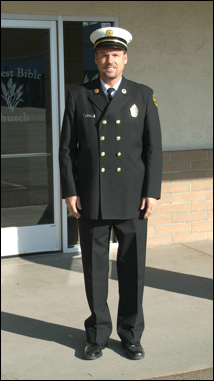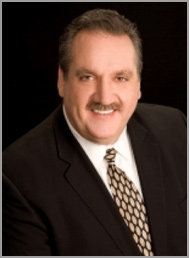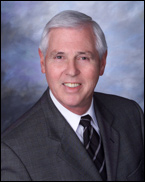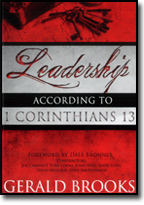The Most Neglected Doctrine of The Christian Faith: Regeneration
John Carter
John Carter is committed to helping people reach their potential in life through spiritual transformation. Known for his engaging and practical teaching style, he is the senior pastor of Abundant Life Christian Center, a culturally diverse church located in Syracuse, NY. He is the founder and president of Mercy Works, a charitable organization that creatively meets the practical needs in distressed urban communities. John and his wife, Lisa have three sons – Jordan, Joshua and Caleb.
This article is an excerpt adapted from The Transformed Life, by John R Carter. The Transformed Life is powerful discipleship tool that is designed to help believers experience personal transformation through a dynamic relationship with Jesus and the local church. The Transformed Life is now available for purchase through Amazon, Barnes and Noble, and Transformedlifenow.com.

The Miracle Of The Christian Faith
 Most people today think that being a Christian involves joining a church or religious group, and trying to live life by following the teachings of Jesus. We often speak of “making a decision for Christ”, and sing things like, “I have decided to follow Jesus….” We imagine that it is all a mental exercise and that the primary distinction between a believer and an unbeliever involves accepting a set of principles. It is common to hear about God writing our names down in the “Lamb’s Book of Life” as if being saved results in little more than getting our name on the right list.
Most people today think that being a Christian involves joining a church or religious group, and trying to live life by following the teachings of Jesus. We often speak of “making a decision for Christ”, and sing things like, “I have decided to follow Jesus….” We imagine that it is all a mental exercise and that the primary distinction between a believer and an unbeliever involves accepting a set of principles. It is common to hear about God writing our names down in the “Lamb’s Book of Life” as if being saved results in little more than getting our name on the right list.
Being a Christian, however, is far more than membership in a religious organization, following a moral code, or even making a decision to believe in Christ and the Bible. When a person is saved God does much more than make an entry in the heavenly ledger. All of these things may occur as one receives Christ, but none of them really explain what actually happens to person when they receive Jesus as their Lord. All the major religions of the world teach that to embrace their particular path involves little more than choosing to adopt a set of beliefs and code of behaviors.
True Christianity, however, makes a far more radical claim.
The Bible teaches that when a person is saved they actually receive a complete and total transformation of their human spirit. The core nature of believer is powerfully, pervasively and permanently changed. The Christian faith, then, is built not upon a behavioral code, but upon a real miracle that occurs in the human heart. The Apostle Paul said,
“Therefore, if anyone is in Christ, he is a new creation; old things have passed away; behold, all things have become new.” (2 Cor 5:17 NKJV)
In historical Christian theology, this truth is called the doctrine of regeneration. All branches of our faith have struggled to define it – often in the context of their efforts to correct one another. While this struggle has produced a rich body of written debate between Catholicism, Protestantism, and Eastern Orthodoxy, it has also left the church wandering in cold landscapes of polarization: each group embracing their particular perspective of truth while denying the biblical truths hidden in the perspective of their opponents. But Biblical truth is typically found in the warm waters of the equator – where most people live.
The question is, exactly how does a fallen human being receive God’s gracious gift of perfect righteousness – forgiveness of sins and complete right standing with God? Furthermore, exactly how does God place His gift of perfect righteousness inside the heart of person who still struggles with sin? How can something so Holy reside in sinful person without becoming corrupted by the sinner? How can Christ “live” in my heart if my heart is desperately wicked? (Jeremiah 17:9).
The Medieval church maintained that God’s righteousness changes the sinner internally, but can be undone by any sinful behavior. This requires a “system” of religious efforts that enable the “leaking” righteousness to be restored. These efforts, known as sacraments, are offered only through the church and therefore results in a salvation that in the final analysis is a combination of faith plus works. The reformers, seeing what this system did to undermine the believer’s faith in the New Testament teaching of salvation by grace, protested.
In reaction to the legalism and bondage they saw in sacramentalism, they emphasized that the gift of righteousness was a permanent judicial action of God. When a believer put faith in the Gospel, God “declared” the sinner righteous with Christ’s perfect righteousness. While the Protestants acknowledged that some kind of change happens to the believer, they maintained that the saved person is still a “sinner” by nature. In other words, the believer is kind of a half-bred child of God; legally righteous, but actually unrighteous; Guilty – but declared forgiven. Eternally saved, but only partially changed.
While each pole has a core truth they are defending, the biblical teaching of salvation is found by accepting the revelation each one provides. Our salvation is both legal and actual. When we are declared righteous by God through faith in the Gospel the Holy Spirit actually makes us righteous internally and eternally. Our status with God is not kept by our works and therefore is an eternal gift. Our nature is actually changed and we become new creations of God – infused with Christ’s own nature and righteousness. This truth can only be fully understood when we understand the architecture of the human being and identify the actual place within us that is regenerated at the new birth.
The Promise Of a New Heart
The prophet Ezekiel was given a vision of a day when God would do a supernatural work in the very heart of His own people. He prophesied, "Then I will sprinkle clean water on you, and you will be clean. Your filth will be washed away, and you will no longer worship idols. And I will give you a new heart, and I will put a new spirit in you. I will take out your stony, stubborn heart and give you a tender, responsive heart. And I will put my Spirit in you so that you will follow my decrees and be careful to obey my regulations (Ezek 36:25-27, 11:19 NLT). Hundreds of years before Jesus was born God shared a secret plan to not only save us from sin, but to change us into saints!
The Prophet Jeremiah was given similar insight. He said, "Behold, the days are coming, says the Lord, when I will make a new covenant with the house of Israel… — I will put My law in their minds, and write it on their hearts; and I will be their God, and they shall be My people…they all shall know Me, from the least of them to the greatest of them, says the Lord.” (Jer 31:31-34 NKJV)
God did not just promise to send a messiah to save us, He promised to change us – to take out of our being the old sinful heart and to create a new one that could contain his very presence.
Changing Wineskins
When Jesus walked the earth He taught the parable of the wineskin. He said, “you cannot put new wine into old wineskins. The wineskins will burst and both will be ruined…” (Matt. 9:17). His meaning was clear. The new wine of God’s Spirit cannot be contained in the old wineskins of the human heart. There must be a new wineskin. God could not put His gift of perfect righteousness and the power or the Holy Spirit into the same sin-stained human vessel.
In order for us to carry His Presence, He would need to change us – to place a new container inside of us that could hold, protect, and preserve His gift of salvation. This is exactly what God does to every person who receives Jesus Christ as their Lord and Savior. He makes us new creations. The Gospel of John declares,
“But to all who believed him and accepted him, he gave the right to become children of God.
They are reborn—not with a physical birth resulting from human passion or plan, but a birth that comes from God.” (John 1:12-13 NLT)
Understanding the Three fold Nature of Man
Just as God is a community of three distinct persons in a single being, so man, formed in His Image, is a single being comprised of three distinct dimensions. In the New Testament Paul clearly identifies these three aspects of human nature when writing to the Thessalonians. He prayed, “Now may the God of peace make you holy in every way, and may your whole spirit and soul and body be kept blameless until our Lord Jesus Christ comes again (1 Thess 5:23 NLT). In the original Greek language there is an important word that separates and distinguishes each word in this description of man’s being. This indicates that the human spirit, soul and body are separate components with each part carrying unique characteristics.
These three parts of our being explain the way God’s salvation comes into lives and transforms us over time. Let’s examine each component, starting from the outside and moving in.
The Body
The word “body” is from the Greek word “soma” and it refers to the physical part of our being. The New Testament also uses the term “flesh” (sarx in Greek) when speaking of the body and its appetites for sin and ungodly pleasures. There are four important truths the Bible teaches about our physical bodies.
Your Body Is Your Earth Suit
Our bodies are our “earth suits”, or the material “house” we live in while on earth. With the body we contact the physical realm. God formed the body from the earth and gave it five senses with which we navigate, process, and interact with the physical world. Our bodies were never designed to rule us, but to be our servants during our lives on earth.
You are not your body. Your body is not the real you any more than the house you live in is the real you. Someone might throw an egg at the front door of my house, but that does not mean they have thrown an egg at me. Our spiritual selves require an physical vessel with which to navigate this life. God designed the body to be the earth suit and servant of the believer’s spirit.
Your Body is Mortal
Through Adam’s fall corruption has invaded our physical beings and man has since become mortal, or “death-doomed.” From the moment we are born into the world we begin our long march towards physical death. Though God graciously equipped our bodies with survival instincts and immune defenses, the effects of sin continue to age and erode our physical beings. Sickness and disease assaults our bodies and sooner or later our physical homes can no longer support our inner spiritual beings. Each of us departs our bodies at physical death. Because of this corruption, our physical bodies need care, rest, exercise and nourishment in order to maximize our lives on earth.
Our Bodies are Naturally Inclined Towards Sin
Your body has a “wild” side. In fact the body is the primary source of temptation. James said, “What is the cause of wars and fighting among you? Is it not in your desires which are at war in your bodies?” (James 4:1 BBE). Paul said, “For when we were in the flesh, the evil passions …were working in our bodies to give the fruit of death. (Rom 7:5 BBE)
The new birth does not immediately change this. Our bodies carry the appetite for sin even after we are saved. “…put on the Lord Jesus Christ, and make no provision for the flesh, to fulfill its lusts.” (Rom. 13:14 NKJV). Therefore every Christian must learn to bring his body into subjection. (1 Cor. 9:27)
Although our body has been infected by sin, and contains a nature that responds to temptation, it can be restrained and controlled by the Holy Spirit. There is a divine purpose for the body and with God’s help it can be “broken” and trained to be used for God’s service. (Rom. 6:13, 12:1)
Our Bodies are not Yet Saved
While the Christian can restrain and retrain the physical body, it will remain mortal. The body, then, cannot be what Paul was referring to when he said “if any person is in Christ he is a new creature…” It is therefore not the body that is “born again.”
The Soul
The word “soul” is translated from the Greek word “psuche” from which we get the English word “psyche” or “Psychology.” It refers to the mind, emotions, intellect and human will. The soul of man is the mental and emotional aspect of man’s nature that processes the information it receives from the body. There are several important characteristics of the human soul:
Your Soul is Your CPU (Central Processing Unit)
Your soul is the seat of your mind, emotions, and will. It is where we process thoughts, experience feelings, and make decisions. As such, your human soul is like a computer. It receives input from the body and processes it into beliefs and actions. With your soul you contact the social and intellectual realms of life. The human soul is continuously forming patterns of thought and feeling from which we make decisions. And, like a computer, it is only as good as the information we “program” into our minds. The soul, then, can be trained or untrained. It is a highly malleable or changeable aspect of our beings.
The Soul is the Battlefield of the Christian Life
There is a war for your thought life. Because the soul sits between the spirit and the body it is constantly choosing which side to obey. Both God and Satan seek to gain influence in your life by capturing the attention of your soul. The New Testament has much to say about our minds and the vital role our thinking plays in living a positive Christian life. This is why we will devote an entire chapter to studying the human soul and God’s plan to renew it through the word of God.
Our Souls are Being Saved
The soul is in a process of transformation. James said, “…humbly accept the word God has planted in your hearts, for it has the power to save your souls.” (James 1:21). This passage was written to people who were already saved. They were new creatures in Christ. Yet their “souls” (Gr. psyche, minds) still needed to be “saved” (Gr. Sozo, to heal or transform). Although they were Christians there was an aspect of their being that needed further transformation. Therefore it cannot be the soul or mind of the person that is born again and made a new creation. There is a final and deeper aspect to the human being. This is the part of us that receives salvation.
The Spirit
The spirit of a person is the real person. Mankind is primarily a spirit being, possessing a soul (mind), and living in a physical body. While the Old Testament sometimes uses the terms “heart,” “soul," and “spirit” interchangeably, the New Testament writings to the church make a clear distinction between the mental and spiritual aspects of our being. There are several important things we need to know about the human spirit in order to appreciate God’s gift of salvation.
Your Spirit is not Your Soul
Failing to distinguish between the soul and spirit will leave the student of the Bible highly confused, especially when studying the New Testament. Paul taught that there was an important distinction between the soul and spirit that could only be understood by the Word of God.
Hebrews 4:12
“God’s word is alive and working and is sharper than a double-edged sword. It cuts all the way into us, where the soul and the spirit are joined…” (NCV)
“For the word of God is living and full of power…cutting through and making a division even of the soul and the spirit …” (BBE)
If the soul and spirit can be divided then they cannot be the same thing. Only be appreciating this important truth can one fully understand the miracle of the new birth. It is not the soul that is made new in salvation. It is the human spirit that is reborn.
Your Spirit is the Eternal You
The human spirit is the eternal person on the inside. Animals have body and soul (mind). But only humans have been given spirit. When God breathed into Adam’s body the breath of life He placed an eternal essence into the core of man’s being. This is the part of man that is made directly in the image of God. Jesus said “God is a Spirit” (John 4:24). Therefore if man is made in His Image, man must also be a spirit being. Your spirit has form and shape that is similar to your physical being, but is incapable of decay and will always exist, whether you receive Christ or not.
Your Spirit is a Direct Creation of God
Every human being has a spirit that was formed as a direct creation of God.
“Thus says the Lord, who…forms the spirit of man within him…” (Zech. 12:1 NKJV)
When a child is conceived, its human parents provide the genetic material for its human body and mind, but God alone can create the human spirit. This is why scripture teaches that at death the body returns to the dust from which it came, but “… the spirit will return to God who gave it.” (Eccl 12:7 NKJV). Notice:
“The Spirit of God has made me, And the breath of the Almighty gives me life.” (Job 33:4 NKJV)
“If God were to take back his spirit and withdraw his breath, all life would cease, and humanity would turn again to dust.” (Job 34:14-15 NLT)
“Thus says God the Lord, Who created the heavens and stretched them out, Who spread forth the earth and that which comes from it, Who gives breath to the people on it, And spirit to those who walk on it…” (Isa 42:5 NKJV)
It is Our Spirit Which is Saved or “Born Again”
As Jesus said to Nicodemus, “that which is born of the Holy Spirit is your spirit” (Jn. 3:6,7). When a person is born again their bodies do not substantially change. If one has a bald head and a big nose before they are saved, they will likely have that same nose and hairline after they are saved. The intellect, thought patterns and knowledge of a person does not suddenly change when one receives Christ either. If a person didn’t know how to cut hair or play football before salvation, chances are they will not suddenly possess that knowledge after salvation. The body and mind do not substantially change. Yet Scripture says that in at least one aspect of our beings, “old things have passed away, all things have become new!” (2 Cor 5:17). Salvation then is work that occurs in the human spirit.
Seeing Yourself as a Spiritual Being
The scripture teaches that God is a spirit being. (John 4:4). We have learned that mankind has been made in the image and likeness of God. Therefore as bearers of His image we are essentially spirits as well.
One of the great struggles of the Christian life arises from confusion about the difference between the spirit, soul, and body. When lust, temptation, or sinful urges arise many believers mistakenly think that that those impulses are coming from their inner true selves. The Bible, however is very clear that it is the corruption of sin dwelling in our flesh or bodies that is the source of every unrighteous desire. You are not your body! Consider these facts,
Physical Death Does Not Diminish the Real You
We do not become a fragmented person when we leave our bodies upon physical death. This is one of the strongest evidences for the fact that you and I are first and foremost spiritual beings.
If you were not a distinct person apart from your body, then upon death you would only be a partial person, some strange remnant of what you once were. However Scripture teaches that when your body dies, it is your complete self that goes to either heaven or hell. Paul speaking of his own death said,
“For to me, to live is Christ, and to die is gain. But if I live on in the flesh, this will mean fruit from my labor…For I am hard-pressed between the two, having a desire to depart and be with Christ, which is far better. Nevertheless to remain in the flesh is more needful for you.” (Phil 1:20-24 NKJV)
If we were not complete and distinct beings apart from our physical bodies, then Paul could not have said that to die is “gain.” It would not be “far better,” because death would be a fracturing of our self – a loss of some sort. This truth should give great encouragement to every believer because regardless of what temptations we suffer in our flesh, they are not originating inside of us if we are new creations in Jesus Christ.
The Human Spirit Has Personal Qualities
Because our spirit is not visible to the physical eye, it is often assumed that our spiritual bodies are ethereal, vapor-like, and formless. Scripture, however, tells us that the spirit is the seat of the soul, and possesses thought, memory, personality, desire and the capacity to feel pain, fear, love, and guilt. Jesus told the story of poor beggar named Lazarus who died and went to paradise, and an unrighteous rich man who died and went to hell. This teaching gives us insight into the capacities of the human spirit after physical death, even when separated from God.
3 In hell, where he was in torment, he looked up and saw Abraham far away, with Lazarus by his side. 24 So he called to him, ‘Father Abraham, have pity on me and send Lazarus to dip the tip of his finger in water and cool my tongue, because I am in agony in this fire.’ 25 "But Abraham replied, ‘Son, remember that in your lifetime you received your good things, while Lazarus received bad things, but now he is comforted here and you are in agony… 27 "He answered, ‘Then I beg you, father, send Lazarus to my father’s house, 28 for I have five brothers. Let him warn them, so that they will not also come to this place of torment.’ (Luke 16:23-28 NIV)
From this story we learn:
- The human spirit exists as a real complete person after it has left the human body.
- The human spirit is conscious and self–aware.
- The human spirit looks similar in form to the human body (a voice, eyesight, tongue, finger, etc. V 23, 24.)
- In our spiritual form we will consciously recognize one another including past friends, family and aquaintances. (V 23)
- The human spirit feels both pain and comfort. (V 24, 25)
- The human spirit has memory of life and loved ones on earth. (V 27 & 28)
- The human spirit has the emotional capacity to desire, grieve, fear, and feel guilt. (V 24, 27)
- The human spirit does not wander the earth like some lost ghost, getting stuck graveyards, closets, or former dwellings. It leaves the earth for either comfort or punishment.
Therefore we see that man is an eternal spirit, possessing a mind and living in a physical body. Since the spirit is the heart or core of our being it is also the place where the nature of sin finds its roots. It is the spirit that must change if we are become children of God.
The Rebirth of the Human Spirit
The new birth is the process by which God accomplishes what He promised through the prophets Ezekiel and Jeremiah, “…I will take out of you the stony heart” and “give you a new heart and place a new spirit within you…” (Jer. 31:31, Ez. 11:19). In the Book of Hebrews God is called “the Father of our spirits…” (Heb 12:9).There are two “births” that the bible speaks of—natural birth and spiritual birth.
Born of the Flesh
Each living person has been “born of the flesh” and is therefore a member of the race of Adam. The nature of sin is present in each human from infancy – a nature that pulls us away from God and places us outside the family of God.
Children of Adam
Our natural birth places each of us “in Adam,” and as a result under the curse of spiritual death.
“For as in Adam all die, even so in Christ all shall be made alive. …The first man was of the earth, made of dust; the second Man is the Lord from heaven. As was the man of dust, so also are those who are made of dust… And… we have borne the image of the man of dust…” (1 Cor. 15:22, 47-49 NKJV)
Because each of us carries the nature of Adam through our natural birth, all humans must have a new birth to enter God’s Kingdom. (John 3:3)
Children of Satan
The sad fact is that Satan is the father of sin and the spiritual leader of everyone who is not born again. Jesus said to those who did not believe in Him, “you are of your father, the devil, and you want to do the desires of your father. He was a murderer from the beginning and does not stand in the truth…” (John 8:44). Later the Bible says, “…the children of the devil are manifest: Whoever does not practice righteousness is not of God…” (1 John 3:10 NKJV)
The Apostle Paul taught the Ephesians that “once you were dead because of your disobedience and your many sins… just like the rest of the world, obeying the devil—the commander of the powers in the unseen world. He is the spirit at work in the hearts of those who refuse to obey God.” (Eph 2:1-2)
The implications of these statements are clear; every unsaved person has the nature and spirit of Satan actively working in them. This does not mean that lost people have become as wicked as possible, or that every unsaved person is knowingly serving the devil. It simply means that Satan has access to, and lordship over their spiritual natures. Through the sinful nature Satan is constantly luring and corrupting the human heart so that it can never be either free from sin or acceptable to God.
Children of Wrath
This is perhaps the most frightening aspect of our inheritance from Adam. Paul went on to tell the Ephesians that before they received Christ, “…we all once conducted ourselves in the lusts of our flesh, …and were by nature children of wrath, just as the others." (Eph. 2:3 NKJV). In Adam each of us is heading towards the ultimate consequences for our sin: the wrath of Almighty God.
It is popular in today’s culture to imagine that God is only capable of love and reward – that He has somehow lost all of that “Old Testament” anger and punishment that seems to show up so often in the Bible. We love to hear sermons on God’s mercy and grace and often bristle at preaching that smacks of “hellfire and brimstone.” Our culture, however, does not have the right to strip God of the aspects of His personality that makes us uncomfortable.
Scripture speaks directly and consistently in both Old and New Testaments about God’s anger with the sin of the human race. Jesus was clear about God’s coming day of wrath; “Then he said to the multitudes that came out to be baptized by him, "Brood of vipers! Who warned you to flee from the wrath to come?" (Luke 3:7 NKJV). Jesus warned openly of the consequences of rejecting Him, “He who believes in the Son has everlasting life; and he who does not believe the Son shall not see life, but the wrath of God abides on him." (John 3:36 NKJV)
Many people imagine today that hell is the place where Satan’s wrath is experienced by sinners. Hell was prepared by God for the devil and his angels (Matt 25:41) not by the devil for sinful people. Hell is God’s prison for sinful human spirits. Do a word study on the word “wrath” in the greek New Testament. What you find will sober you. When a person dies without Christ they are placed in hell where they experience not the wrath of Satan, but the fierce wrath of a holy God.
Born of the Spirit
For all of these reasons each man, woman and child needs a second birth. This is why Jesus told Nicodemus, “you must be born again.” Even our best religious efforts cannot change the condition or our hearts. In the new birth God literally removes the corruption of sin from the human heart and replaces it with His own Nature. Instead of being born “in Adam” the believer is now reborn “in Christ.” There are several important steps that occur in the new birth.
The Heart is Awakened
The Scripture says that our sinful nature blinds us to our need for Christ. Paul declares that we are dead in our trespasses and sins. It is only through the preaching of the Gospel that the Holy Spirit awakens us from spiritual death and creates within us a realization of our sinful condition and a yearning for the love of Jesus. “And you who were dead in your trespasses and sins He has made alive…” (Eph. 2:1). “I am not ashamed of the Gospel for it is the power of God unto salvation for everyone who believes…” (Rom. 1:16). The first step in being born again is hearing the Gospel.
The Heart Believes
The Scripture says, “…faith comes by hearing, and hearing by the word of God.” (Rom. 10:10). Whenever the message of Christ is preached the Holy Spirit is present to enable our “stony” and hard hearts to believe it. There is a supernatural work of God that draws fallen man to Christ through the Gospel. Jesus said, “No one can come to me unless the Father who sent me draws him.” (John 6:44). God not only tells us what we must believe (the Gospel) but also gives us the capacity to do so!. In this way our salvation is completely the work of God. “By grace you have been saved through faith, and that not of yourselves – it is the gift of God, not of works, so that no man can boast.” (Eph. 2:10)
The Heart is Changed
This is the great miracle of salvation. We call this regeneration. Once a person trusts in Christ the miracle of the new birth occurs.
“But to all who believed him and accepted him, he gave the right to become children of God. They are reborn—not with a physical birth resulting from human passion or plan, but a birth that comes from God." (John 1:12-13 NLT)
Characteristics of the Transformed Heart
Many Christians live and die never having fully understood or appreciated the exact nature of what happened to them the day they became born again. Recently, I spoke to a couple who had been struggling to pay their bills. They both worked very hard and were praying for some extra income. One day during a local state fair the man was walking past various displays in one of the public buildings and noticed a booth that had been set up by the state. Upon inquiry he discovered the station was designed to help people discover unclaimed funds that had been kept on the state books. When this man entered his information, he was thrilled to discover that he had over $1000 in unclaimed refunds that was due him. He simply filled out a claim form and received his check.
Very often we are struggling to live the Christian life completely unaware that God has already given us “everything that pertains to this life and living godly.” (2 Peter 1:3). When a person is born again a miracle occurs in their human spirit and they instantly receive a bounty of gifts, graces, and special rights that belong to them as citizens of the Kingdom of God. You cannot take advantage of anything you don’t know you have. The Bible is a book that was written to inform us of what belongs to us in Christ, and to teach us how to claim the blessings that God has deposited in the accounts of every one of His children.
Instant and Complete Transformation
Becoming born again is not a gradual process that takes place over time. It occurs the moment we believe the Gospel. God instantly transfers the believer out of the kingdom of darkness and into the kingdom of His dear Son. You do not develop gradually into a Christian. There may be a long process prior to the new birth in which God works with your life and draws your mind towards Christ. There is a life long process after the new birth in which the believer learns to walk in their new nature. But there is single moment in which the actual transaction occurs. One moment you are a child of the devil and the next you are a child of God. (Col 2:9,10)
Born A Real Child Of God (1 John 3:1, Gal. 4:6)
Many people believe that everyone is a child of God just by virtue of being born into this world. But as we have seen, the opposite is true. Natural birth makes one a child of sin. The second birth makes one a child of God. Being a child of God is not a metaphor or turn of phrase either. One is not merely “counted” or “adopted” as a child of God. The Bible teaches that when a person is born again their entire spiritual nature is regenerated with the very life and nature of God Himself. God’s very own life force, His holy Seed is planted into the human heart.
Born Into His Family
God desired a family. When he first formed Adam and Eve His plan was to raise up a family of sons and daughters who would be in His likeness and would love Him with free hearts. When a person is born again, they not only receive God as their Father, but the are instantly connected to every other child of God that has ever lived. The Apostle Paul called God the Father “…from whom the whole family in heaven and on earth in named…” (Eph. 3:10). This means that we have an instant spiritual family made up of children of God from every race, nation, tribe and tongue.
God’s family on earth is called His Church. Wherever God’s children live on earth, we are instructed to join together in local churches in order to worship, learn, give, grow, and serve together.
Born Imperishable
Natural birth is a permanent and irreversible entrance into a human family. Once a child is conceived and born it will always carry the DNA of its parents. There is nothing we can do to change our birth parents. We carry their image in our very genes. In the same way, when a person is born again, they are re-created to be the actual spiritual offspring of God. This occurs by the power of the Holy Spirit and is part of God’s eternal plan, which He determined before the foundation of the world. This means the new birth is a radical, powerful, and permanent change in the human spirit. God Himself has determined to keep His own children and finish the work He has begun in them. (Phil. 1:6)
The Apostle John, speaking of the born again heart makes the remarkable statement: “Whoever has been born of God does not go on practicing sin, for His Seed remains in him; and he cannot sin because he has been born of God.” (1 John 3:9). John is not implying that Christians do not ever sin. In the first Chapter of this same letter John says that if we (believers) say that we have no sin we are liars”, and “if we confess our sins He is faithful and just to forgive us our sins…”(1 John 1:8-9)
Naturally, as long as we live in our mortal bodies, we are susceptible of falling into sin. John is saying that the part of us that is born of God, our born again spirits are not the source of temptation and sin in our lives. It is our born again spirit that pulls us towards righteousness every time. The word “seed” in 1 John 3:9 is the greek word “sperma.” It is the word that is directly translated in English as the seed of the male. God’s “sperma” , His very nature and life has given birth to the Christian heart and it therefore a child of God remains so for eternity.
Sealed By The Holy Spirit
This concept of being a child of God is possible because once the Holy Spirit changes our hearts, He seals them. In Ephesians 1, the Apostle Paul reveals this wonderful truth.
“…in whom also, having believed, you were sealed with the Holy Spirit of promise, who is the guarantee of our inheritance until the redemption of the purchased possession, to the praise of His Glory.” (Eph. 1:13-14)
“And do not grieve the Holy Spirit of God, by whom you were sealed for the day of redemption…” (Eph. 4:30)
The greek word translated “sealed” in these verses is the word “Sphragizo.” It is a word that was taken from idea of a King sealing a royal document with his own personal insignia ring. Once sealed, the document could not be opened nor the seal broken by anyone but the king himself. These seals also contained date stamps that indicated when the document would be opened and the King’s desires fulfilled. By using this special word God is telling us that once we believe on Christ and are born again, God seals our salvation into our spirits. This sealing protects our eternal relationship with Him until the Day of our final redemption. This is why a believer may fall into sin with their bodies and minds, but our hearts are kept by His own power until He comes to finish what He started in our lives.
Receives Eternal Life
Jesus said that “My sheep hear my Voice, and they follow me. And I shall give them eternal life and they shall never perish, neither shall anyone snatch them out of my hand.” (John 10:27, 28). Later Jesus said, “I am the Resurrection and the Life, He that believes in me shall never die…” (John 11:25). Eternal life is very essence of God’s own life coming into our spirits.
Quality of Eternal Life
Because we receive God’s own life the moment we believe in Christ we receive something of eternal value and quality. God is eternal so anything that comes from Him bears the quality of His own eternal nature.
Effects of Eternal Life
Once God’s life comes into our hearts it begins to transform our lives. Nothing will ever be quite the same again. His life instantly changes our spirits and then goes to work on our souls, bodies, relationships, vocations, and lifestyle. The life of God blesses everything it touches. It impacts our feelings, our finances, and our families. Most believers have never fully allowed the Divine Life that is in them to govern their lives. It is powerful and effective.
Nature of Eternal Life
As Jesus taught once one receives eternal life they shall never perish. In the original greek there are actually three negatives in this verse. It is a way of stating something emphatically. Jesus made it clear that His life once imparted to our hearts guarantees we will belong to Him and the Father for all eternity.
Many Christians bristle at this idea of our salvation being permanent. They imagine that if one believes they are eternally children of God there will be no reason to continue to pursue a righteous life. No doubt there are many who take advantage of God’s gracious gift and behave poorly, looking for a quick and easy forgiveness. Paul warns against those who would turn the grace of God into a license to sin (Jude 1:4).
The Scripture does contain many warnings against sin and its consequences. A number of these verses indicate that salvation could be forfeited if we were to continue in sin without interruption. It also indicates that if this were to happen the forfeited salvation could never be regained (Hebrews 6:4-6). Thankfully, God has a plan that includes discipline for His children who fall into sin (Heb. 12:5-11) while simultaneously working in their lives in such a way to restore us (Heb. 6:9).
The true doctrine of salvation does not teach that one can become saved and then live any way they want to without consequence. It actually teaches that if one is genuinely saved and truly born of God they have been changed. Our new spirits, no longer satisfied with sin, will want to live for God. While the flesh and un-renewed mind still feels the tug of temptation, the regenerated spirit wants to do what is right.
When a genuine believer sins there are real consequences in this life (loss of victory, confidence, testimony, and the disciplinary Hand of God) and in the next (loss of rewards at the judgment seat of Christ, 1 Cor. 3:12-15). If a person says they have been born again, but continues to practice sin without any sense of conviction or desire to change, their conversion is a fable. To be saved is to receive a new nature that fights against the desires for pleasure that wage war in our flesh and in our minds (James 4:1, 1 Peter 2:11). The new birth really changes our hearts.
The Dual Nature Error
It is important to understand that once a person is born again they do not have two natures in their spirits. Scripture says that once saved, the old is gone and the new has come. No person can have two natures in their spirits at the same time. One is either a child of the devil or a child of God. You cannot be both. (Matt. 12:30, 1 John 3:10).
The fight in the Christian life is not within the spirit of the believer. Our fight is between our inner man and our outer man. It is a war between the believer’s born again spirit, made in the likeness of God and the believer’s flesh which still bears the nature of Adam. Understanding and engaging this battle successfully is essential to Christian victory.
God’s Indwelling Presence
The final wonderful truth we will examine about the new birth is that when a person receives the new birth the fullness of the Triune God comes to live inside them. John said “…You are of God, little children, and have overcome…because greater is He that is in you than he that is in the world.” (1 John 4:4). Paul taught that “…He who raised Jesus from the dead will give life to your mortal bodies through His Spirit who dwells in you.” (Romans 8:11)
One of the most amazing and wonderful truths in the New Testament is the revelation that God Himself has come to make His home inside of us. The indwelling of God’s presence is not a mere philosophical concept or religious notion. It is a real fact and perhaps the most wonderful part of being born again.
This brings us back to ancient prophecy of Ezekiel. Remember he said that a day was coming in which God would take the stony heart out of our flesh, and give us a new spirit. “And I will put My Spirit within them…” When we trust in Jesus Christ, the Father supernaturally takes the old wineskin out of us and creates a new wineskin into which He can pour Himself. There is nothing more wonderful than being born again.
Our Message: You Must Be Born Again!
As ministers of the new covenant we must boldly proclaim the miracle of the new birth. It is the greatest work of God on earth. It is a miracle of transformation in which God changes the human heart and removes the curse of sin and imprint of Adam’s nature from our very being. This supernatural work sets the Christian faith apart from every other religion in the world. Human religion seeks to alter man’s heart through codes of behavior. Believing in Jesus Christ changes our hearts instantly so that He work through us to change our behavior.
12 Dear friends…work hard to show the results of your salvation, obeying God with deep reverence and fear. 13 For God is working in you, giving you the desire and the power to do what pleases him. (Phil 2:12-13 NLT)

 We are only weeks away from the end of 2010 which means that Christmas will be here before we know it. While shopping for Christmas presents is at the top of everyone’s mind during this time frame, it is also a great time to take some proactive steps to reduce your income tax liability. Pastors especially have some key areas that allow for income tax saving opportunities which need to be carefully considered. Following is a list of some key tax-saving steps that could make filing your income tax return a whole lot less painful this year.
We are only weeks away from the end of 2010 which means that Christmas will be here before we know it. While shopping for Christmas presents is at the top of everyone’s mind during this time frame, it is also a great time to take some proactive steps to reduce your income tax liability. Pastors especially have some key areas that allow for income tax saving opportunities which need to be carefully considered. Following is a list of some key tax-saving steps that could make filing your income tax return a whole lot less painful this year.
 Hello, my name is Rev. Scott Porter. I am the Senior Pastor at
Hello, my name is Rev. Scott Porter. I am the Senior Pastor at 
 In Christian leadership there are not any shortcuts. In this day of accelerating pace, instant messaging and faster computers, leadership has not changed. It requires the simple but powerful process of prayer.
In Christian leadership there are not any shortcuts. In this day of accelerating pace, instant messaging and faster computers, leadership has not changed. It requires the simple but powerful process of prayer. 
 It is inevitable that every Senior Pastor’s season of having the responsibility of leading a church comes to an end. For the ongoing viability of a church, every congregation needs to address the issue of succession. The success of this transition depends upon the recognition of its necessity by the Senior Pastor. He has an extremely important role in the transition. It is better for the senior leader to spearhead the transition rather than having the congregation or other leaders within the church experience the pain of asking a beloved ‘Man of God’ to step away or step down from the leadership role.
It is inevitable that every Senior Pastor’s season of having the responsibility of leading a church comes to an end. For the ongoing viability of a church, every congregation needs to address the issue of succession. The success of this transition depends upon the recognition of its necessity by the Senior Pastor. He has an extremely important role in the transition. It is better for the senior leader to spearhead the transition rather than having the congregation or other leaders within the church experience the pain of asking a beloved ‘Man of God’ to step away or step down from the leadership role. Several years ago I was praying and I sensed the Lord speaking to my heart. He asked me a question? He said, "If Harvest Bible Church was gone would the community miss you or even notice you are gone?" I had to answer with probably not. And so began my quest to make a difference in my community and city. We looked for projects that we could involve our church and help out in.
Several years ago I was praying and I sensed the Lord speaking to my heart. He asked me a question? He said, "If Harvest Bible Church was gone would the community miss you or even notice you are gone?" I had to answer with probably not. And so began my quest to make a difference in my community and city. We looked for projects that we could involve our church and help out in. Through this door God opened another door for me to become the Senior Fire Chaplain for another group which has opened doors for my whole County. Yes this takes time and energy and money but the fruit has been great and I am a voice to not only my community and the city but the County.
Through this door God opened another door for me to become the Senior Fire Chaplain for another group which has opened doors for my whole County. Yes this takes time and energy and money but the fruit has been great and I am a voice to not only my community and the city but the County.  Rev. Jeff E. Walker
Rev. Jeff E. Walker The primary roles of a pastor are to feed the spirit and to shepherd the soul of each woman or man the Lord entrusts to the care of that minister. The soul, or psuche (I Thes 5:23) in Greek, has much to do with the mental health of an individual. While the Church and pastors seem to have crossed over the hurdles of the subjects of sex and money and those being addressed in appropriate ways from pulpits, one hurdle remains to be jumped. Mental health and psychology may be a final frontier with regard to the efficient and effective application of the Gospel in helping God’s people.
The primary roles of a pastor are to feed the spirit and to shepherd the soul of each woman or man the Lord entrusts to the care of that minister. The soul, or psuche (I Thes 5:23) in Greek, has much to do with the mental health of an individual. While the Church and pastors seem to have crossed over the hurdles of the subjects of sex and money and those being addressed in appropriate ways from pulpits, one hurdle remains to be jumped. Mental health and psychology may be a final frontier with regard to the efficient and effective application of the Gospel in helping God’s people. Mark Helland, CPA is a partner with the accounting firm of Elliott, Dozier and Helland, PC which is located in Tulsa, Oklahoma. For further information on this topic, Mark’s firm has a short report on basic fraud prevention tactics which is available to you at no cost. Mark can be contacted via email at
Mark Helland, CPA is a partner with the accounting firm of Elliott, Dozier and Helland, PC which is located in Tulsa, Oklahoma. For further information on this topic, Mark’s firm has a short report on basic fraud prevention tactics which is available to you at no cost. Mark can be contacted via email at  You may already know about "That Guy." I’ve never known his real name, so “That Guy” will have to do. I’ve asked many people about him. Most claim to know him but are either unwilling or unable to name him. When I first started preaching I thought he must surely have been following me around. It seemed that every place I went, someone would ask me about “That Guy.” My guess is that you have heard of him, too.
You may already know about "That Guy." I’ve never known his real name, so “That Guy” will have to do. I’ve asked many people about him. Most claim to know him but are either unwilling or unable to name him. When I first started preaching I thought he must surely have been following me around. It seemed that every place I went, someone would ask me about “That Guy.” My guess is that you have heard of him, too.





 As long as we live in this world, we’re going to have to deal with the potential of being offended. We can’t prevent offenses from happening, but we can avoid taking offense and getting bitter. Opportunities to get offended will always present themselves to each one of us. In fact, Jesus Himself told us that it would be impossible to avoid offenses because they will come (see Luke 17:1). Jesus wasn’t being the bearer of bad news when He said that — He was just telling us the truth.
As long as we live in this world, we’re going to have to deal with the potential of being offended. We can’t prevent offenses from happening, but we can avoid taking offense and getting bitter. Opportunities to get offended will always present themselves to each one of us. In fact, Jesus Himself told us that it would be impossible to avoid offenses because they will come (see Luke 17:1). Jesus wasn’t being the bearer of bad news when He said that — He was just telling us the truth.  Becoming a Christian is the greatest decision any person ever makes and being a Christian is the greatest adventure anyone can live. And, it all starts with the right foundation––the basics!
Becoming a Christian is the greatest decision any person ever makes and being a Christian is the greatest adventure anyone can live. And, it all starts with the right foundation––the basics!  This past year, at the end of the pastoral transition at LifePointe Church, one of my minister friends sent me a text, asking, “Who is the new skipper?” This was a time when we went through a process of finding and doing some things that worked to make a successful pastoral transition (and also doing some things that didn’t work). Thankfully, more of the things we did worked than didn’t work!
This past year, at the end of the pastoral transition at LifePointe Church, one of my minister friends sent me a text, asking, “Who is the new skipper?” This was a time when we went through a process of finding and doing some things that worked to make a successful pastoral transition (and also doing some things that didn’t work). Thankfully, more of the things we did worked than didn’t work! Gary Crowl has served in a variety of ministry capacities since 1979. For eleven years, Gary was a part of the staff at Kenneth Hagin Ministries, serving as an Associate Pastor, Assistant Director of the RHEMA Ministerial Association International, the Dean and an Instructor of RHEMA Bible Training Center. Prior to his service at RHEMA, Gary pioneered and pastored four churches and two bible schools in three different nations of the world. He is a 1979 graduate of RHEMA Bible Training Center and holds a Bachelor of Science degree in Church Ministries from Southwestern University.Currently, Gary travels throughout the world, training and educating men and women to discover their purpose in life. Gary’s true passion is focused on providing direction, training, vision, and resources for leaders in unreached nations of the world.
Gary Crowl has served in a variety of ministry capacities since 1979. For eleven years, Gary was a part of the staff at Kenneth Hagin Ministries, serving as an Associate Pastor, Assistant Director of the RHEMA Ministerial Association International, the Dean and an Instructor of RHEMA Bible Training Center. Prior to his service at RHEMA, Gary pioneered and pastored four churches and two bible schools in three different nations of the world. He is a 1979 graduate of RHEMA Bible Training Center and holds a Bachelor of Science degree in Church Ministries from Southwestern University.Currently, Gary travels throughout the world, training and educating men and women to discover their purpose in life. Gary’s true passion is focused on providing direction, training, vision, and resources for leaders in unreached nations of the world.  Most people today think that being a Christian involves joining a church or religious group, and trying to live life by following the teachings of Jesus. We often speak of “making a decision for Christ”, and sing things like, “I have decided to follow Jesus….” We imagine that it is all a mental exercise and that the primary distinction between a believer and an unbeliever involves accepting a set of principles. It is common to hear about God writing our names down in the “Lamb’s Book of Life” as if being saved results in little more than getting our name on the right list.
Most people today think that being a Christian involves joining a church or religious group, and trying to live life by following the teachings of Jesus. We often speak of “making a decision for Christ”, and sing things like, “I have decided to follow Jesus….” We imagine that it is all a mental exercise and that the primary distinction between a believer and an unbeliever involves accepting a set of principles. It is common to hear about God writing our names down in the “Lamb’s Book of Life” as if being saved results in little more than getting our name on the right list. Dale Marples and his wife, Betty Jo, are ordained through Rhema Bible Training Center and had been pastors for 24 years before retiring in 2010. They pioneered 3 churches during that time. Dale has a degree from the University of Nebraska in Business Administration and Finance. After serving as an officer and pilot in the U.S. Air Force he became a National Bank Examiner and Executive Officer in banking for 25 years. Dale also was Director of Treasury and Budget for the Oral Roberts Evangelistic Association for several years.
Dale Marples and his wife, Betty Jo, are ordained through Rhema Bible Training Center and had been pastors for 24 years before retiring in 2010. They pioneered 3 churches during that time. Dale has a degree from the University of Nebraska in Business Administration and Finance. After serving as an officer and pilot in the U.S. Air Force he became a National Bank Examiner and Executive Officer in banking for 25 years. Dale also was Director of Treasury and Budget for the Oral Roberts Evangelistic Association for several years. Everybody handles money, but not the same amount nor in the same manner. I live in Omaha where Warren Buffet lives. Unfortunately, I don’t handle the same amount of money he does nor do I have the same responsibilities that he has.
Everybody handles money, but not the same amount nor in the same manner. I live in Omaha where Warren Buffet lives. Unfortunately, I don’t handle the same amount of money he does nor do I have the same responsibilities that he has. One Sunday, a man decided to sleep in, and soon his pretty wife came in to wake him.
One Sunday, a man decided to sleep in, and soon his pretty wife came in to wake him.  Rev. Jim Herring is gifted Bible teacher who ministers God’s Word in a passionate, powerful, and practical way. The focus of Jim’s ministry is to help believer’s overcome the trials of life, walk by faith, and reach their full potential in life.
Rev. Jim Herring is gifted Bible teacher who ministers God’s Word in a passionate, powerful, and practical way. The focus of Jim’s ministry is to help believer’s overcome the trials of life, walk by faith, and reach their full potential in life. A sobering and comforting fact we learn from the Apostle Paul is: we all need cleaning.
A sobering and comforting fact we learn from the Apostle Paul is: we all need cleaning.
 Gerald Brooks, D.D. is the founding Pastor of Grace Outreach Center, an interdenominational church in Plano, Texas. The church began in 1982 and throughout the past 27 years has grown to a weekend attendance of over 4,300. Grace Outreach Center has creatively targeted youth and children as the focus of its ministry. Pastor Brooks is well-known for his passionate heart to help other pastors, and he mentors and teaches ministers across the country through church growth seminars, roundtables, and monthly leadership lessons. Pastor Brooks is the author of eight books and a contributor to the New Spirit Filled Life Bible. For additional information visit
Gerald Brooks, D.D. is the founding Pastor of Grace Outreach Center, an interdenominational church in Plano, Texas. The church began in 1982 and throughout the past 27 years has grown to a weekend attendance of over 4,300. Grace Outreach Center has creatively targeted youth and children as the focus of its ministry. Pastor Brooks is well-known for his passionate heart to help other pastors, and he mentors and teaches ministers across the country through church growth seminars, roundtables, and monthly leadership lessons. Pastor Brooks is the author of eight books and a contributor to the New Spirit Filled Life Bible. For additional information visit  “When I was a child I spoke as a child, I understood as a child, I thought as a child, but when I became a man I put away childish things.” 1 Corinthians 13:11
“When I was a child I spoke as a child, I understood as a child, I thought as a child, but when I became a man I put away childish things.” 1 Corinthians 13:11